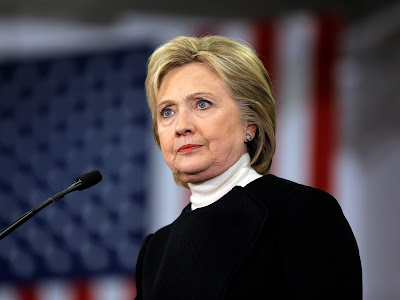Clinton and the Benghazi Fiasco
An 800-page report and $7 million later, the House Select
Committee on Benghazi has found no new evidence on the circumstances of the
attack: more importantly for the Republicans, they are no closer to indicting
Hillary Clinton or diminishing her presidential prospects. This is
telling, given that this has amounted to being, according to David M.
Herszenhorn, perhaps one of the most 'bitterly partisan congressional
investigations in history'. The committee was led by South Carolina Republican
Trey Gowdy, who among other things accused Hillary Clinton, then Secretary of
State, and the Obama Administration of purposefully withholding evidence and stymieing earlier investigations into the culpability of the Defense Department,
Central Intelligence Agency and State Department in their failure to protect
the personnel stationed at the outpost. Taken in its entirety however, the
report does precious little to substantiate accusations of negligence on the
part of Clinton; it presents truculent criticism of the lack of preparedness on
the part of the government, but it 'did not dispute that United States military
forces stationed in Europe could not have reached Benghazi in time to rescue
the personnel who died — a central finding of previous inquiries.' The
investigation has no doubt been a significant source of pressure on the
Democratic presumptive nominee, but it bears asking whether digging up the dirt
on Clinton contributes to the political debate raging all across the United
States or whether it is mere Republican posturing. There is scarce mention of
possible measures to rectify the organizational weaknesses that allowed this
attack to take place. It seems clear also that the findings thus far lend
little weight to the politicization of Clinton's errors.
The Benghazi incident has become a sort of symbol of the
incompetence of the Obama Administration, having been capitalized upon by
Republicans in order to generate controversy over Clinton's bid for the
presidency. While it does not quite reach the notoriety of the Watergate
scandal, parallels have been drawn between the two (although probably
unjustifiably). It is interesting to contrast however the initial frenzy with
which Donald Trump and supporting Republicans had fallen upon the news of the
congressional investigation and the rate at which it fizzled out in mere days
and weeks. Premature forecasts of Clinton’s indictment and imprisonment were
loudly proclaimed by Trump’s mouthpieces, playing up the controversy of the
situation in polemics that boldly asserted the Democratic nominee’s latent
criminality. What later amounted to a mere slap on the wrist was touted as the
downfall of the Clinton legacy and a great source of material for Trump’s
demagogic machine.
Yet, if it were not clear from the outset, the investigation
failed to provide any damning evidence, beyond reopening the issue on Clinton’s
email scandal. Quite predictably, the Trump campaign took this to be evidence
par excellence for the corruption of the American establishment, taking as the
basic assumption the incontrovertible, unassailable fact that Clinton is a
criminal. Further inquiries into the email scandal likewise failed to produce
any concrete outcome beyond some bad publicity: both the Director of the FBI
James B. Comey, Jr. and Attorney General Loretta Lynch agreed that no charges
should be, and would be, filed. Still, it is testament to the power of
political partisanship and Trump’s equally formidable rhetoric that assumptions
of some form of culpability (on Clinton’s part) have taken root.
It has been made abundantly clear that there is a distinct
lack of evidence available to properly indict the Democratic nominee, now
leading Trump by what is still a sizeable margin in the pre-election polls. The
significance of the attempts made to pull down her political prospects lies
rather in its power to rally the masses discontented with Obama’s
administration and those more prone to credulity. Such attempts have kept Trump
in the media spotlight, as he is wont to be, but might prove to be
counterproductive for the GOP.
The Republican Party have found it difficult to rally around
their obstreperous presumptive nominee, if reports that Trump has been finding
difficulty wooing speakers for his convention hold any water. Fellow
Republicans have denounced his methods as brazen, divisive and beyond the pale,
citing his instances of racism manifest in his public speeches. In response, he
has lashed out against his opponents, relentlessly trumpeting Clinton’s
criminal tendencies and the treachery of Republicans who have professed their
unwillingness to side with their own nominee.
The Benghazi fiasco exemplifies the Republican nominee’s
modus operandi. Regardless of the facts or circumstances, much ado will be made
over nothing, lies will be spun and trivial scandals politicized in all their
lurid detail. In doing this Trump may be paradoxically strengthening Clinton’s
position; already he has found himself in a precarious position, isolated by
powerful business interests and political allies alike. By focusing his assault
on Clinton’s alleged malfeasances, despite her express acquittal of the
administration, he makes enemies of the incumbent establishment as well. He is
lambasted by journalists, judges, authors and much of the international community,
finding support only amongst a few outspoken domestic supporters. If inciting
nationalist fervor in support of making America ‘Great’ is Trump’s agenda, his
success has been surprising but equivocal. A portion of the electorate supports
his inchoate economic and immigration policies, the latter on which he has been
forced to compromise on with respect to the proposed ban on Muslims, but an
as-yet greater proportion of voters (if Clinton’s popularity is any indication)
has poured scorn on these vaguely enunciated directions.
Trump’s tendency to make massive political blunders will
probably be his greatest liability in the run-up to the elections. Even while
the Benghazi saga played out to the detriment of the GOP and through the Republican-fueled controversy of its denouement, Trump was making his usual
rounds over social media for his portrayal of what was taken to be anti-Semitic
sentiment. He had emblazoned a Star of David with the oft-quoted allegation of
Clinton’s corruption, on a background of greenbacks and beside the latter’s
smiling picture. He would later argue that it was a simple sheriff’s star;
sheriff’s star or not, its potential to be misunderstood should have been realized. His failure at the finer points of propaganda puts him at a disadvantage vis-à-vis Clinton, who has not been above dragging the Trump name through the
mud on more substantiated allegations.
Yorck




Comments
Post a Comment